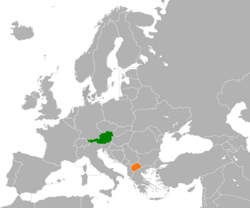 | |
Austria | North Macedonia |
|---|---|
Bilateral relations exist between the Republic of Austria and the Republic of North Macedonia. [1] Diplomatic relations between the two countries were established on 23 December 1994. [2] Austria maintains an embassy in Skopje, while North Macedonia maintains an embassy in Vienna. [3] Austria is an EU member and North Macedonia is an EU candidate.



